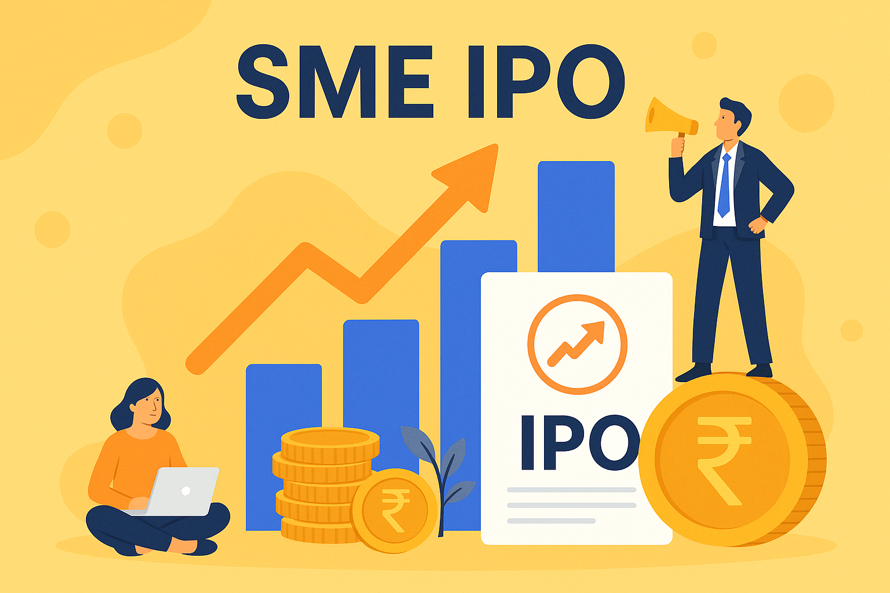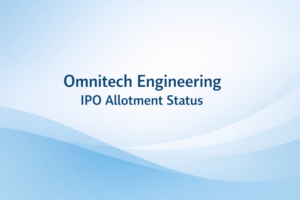SME IPOs in India: A Strategic Gateway for Small Businesses to Go Public

Small and Medium Enterprises (SMEs) are the backbone of India’s economy. Yet, for decades, they’ve struggled to access formal capital. Enter the SME IPO—an increasingly powerful tool that helps smaller companies raise public funds, scale faster, and join the formal economy without being overshadowed by large-cap giants.
This guide breaks down what SME IPOs are, how they work, who they’re for, and why they matter for India’s growth story.
What Is an SME IPO?
An SME IPO (Initial Public Offering) allows small and medium-sized companies to raise capital by offering shares to the public for the first time. But unlike traditional IPOs, these offerings are hosted on specialized platforms—BSE SME and NSE Emerge—built to cater specifically to smaller businesses.
The listing norms, regulatory processes, and costs are tailored to the scale and risk profile of SMEs, making it far more feasible for them to tap into public capital.
Why SME IPOs Matter
For Businesses:
- Raise growth capital without taking on debt
- Improve credibility and trust with customers, partners, and investors
- Offer exit options for early investors
- Attract and retain talent with equity-based incentives
- Enable future fundraising via follow-on public offerings
For the Economy:
- SMEs account for ~40% of India’s industrial output and exports
- SME IPOs support job creation, innovation, and economic decentralization
- Bring transparency and governance to the informal sector
Key Eligibility Criteria
Before an SME can go public, it must meet certain conditions:
- Company Size: Post-issue paid-up capital must not exceed ₹25 crore
- Track Record: Must be in business for at least 3 years
- Profitability: At least 2 of the last 3 years must show operating profit
- Net Worth: Minimum ₹1 crore in net worth for the past 2 years
- Tangible Assets: At least ₹3 crore in the last financial year
SEBI has also introduced new rules to protect investors—like capping general-purpose fund usage and banning promoter loan repayments with IPO proceeds.
Step-by-Step: The SME IPO Process
Here’s how a typical SME IPO unfolds:
- Planning & Readiness
Companies assess their financials, compliance status, and IPO suitability. - Appointment of a Merchant Banker
This SEBI-registered professional leads the IPO effort and coordinates legal, auditing, and underwriting tasks. - Due Diligence & DRHP Filing
A detailed Draft Red Herring Prospectus is prepared, reviewed, and made public for feedback. - Exchange Review & Approval
NSE or BSE conducts site visits and management interviews before granting in-principle approval. - Final Pricing & RHP Submission
Issue price and dates are finalized and published in the Red Herring Prospectus. - Roadshows & Marketing
Awareness campaigns and investor meetings are held to attract subscriptions. - Public Subscription & Allotment
Investors subscribe, and shares are allocated based on demand (with new lottery-based allotment for HNIs). - Listing on SME Exchange
Shares begin trading on the BSE SME or NSE Emerge platform. - Post-Listing Compliance
Companies must file financials, governance reports, and disclosures regularly.
Benefits & Challenges for Companies
Pros:
- Non-dilutive capital
- Improved governance
- Potential to migrate to the main board later
Cons:
- High preparation and compliance burden
- Costs ranging from ₹25–₹50 lakh
- Need for seasoned advisors and legal counsel
Should You Invest in SME IPOs?
Opportunities:
- Early entry into high-growth businesses
- Potential for large listing gains
- Portfolio diversification beyond blue-chip stocks
Risks:
- Illiquidity due to low trading volume
- High minimum investment (₹2 lakh+)
- Limited research and analyst coverage
- High volatility
SME IPOs are best suited for High Net Worth Individuals (HNIs) and experienced investors who can afford to take calculated risks and perform their own due diligence.
SME Platforms: BSE SME vs. NSE Emerge
| Feature | BSE SME | NSE Emerge |
|---|---|---|
| Operator | Bombay Stock Exchange | National Stock Exchange |
| Established | 2012 | 2012 |
| Migration to Mainboard | 185+ companies | 140+ companies |
| 2023 Listings | 62 | 120 |
| Liquidity | Lower | Higher |
| Infrastructure | Robust | Advanced |
Both platforms provide pathways to mainboard listings and are central to India’s efforts to formalize and scale the SME sector.
Key Takeaways
- SME IPOs provide small businesses a powerful alternative to loans or VC funding
- They promote governance, transparency, and growth
- Investors must approach with a high-risk appetite and long-term mindset
- Strong preparation and expert support are critical for IPO success
Future Outlook
As the Indian economy grows and MSME definitions evolve, more companies will become eligible for SME IPOs. SEBI’s tightening of rules reflects a maturing ecosystem aimed at reducing fraud, improving transparency, and increasing investor confidence.
With the right mix of advisory support, financial hygiene, and strategic vision, SME IPOs can be a game-changer—not just for individual businesses, but for the Indian economy as a whole.
FAQs
Q: What’s the minimum investment in an SME IPO?
A: Typically ₹2 lakh (two lots), making it less accessible to casual retail investors.
Q: Can a company move from SME platform to mainboard?
A: Yes, once it meets specific financial and operational criteria.
Q: Are SME IPOs regulated by SEBI?
A: Yes, but SEBI delegates prospectus approval to stock exchanges for SME IPOs.
Q: How long does the SME IPO process take?
A: Around 3–4 months, depending on the company’s preparedness.
Disclaimer
The stocks mentioned in this article are not recommendations. Please conduct your own research and due diligence before investing. Investment in securities market are subject to market risks, read all the related documents carefully before investing. Please read the Risk Disclosure documents carefully before investing in Equity Shares, Derivatives, Mutual fund, and/or other instruments traded on the Stock Exchanges. As investments are subject to market risks and price fluctuation risk, there is no assurance or guarantee that the investment objectives shall be achieved. Lemonn (Formerly known as NU Investors Technologies Pvt. Ltd) do not guarantee any assured returns on any investments. Past performance of securities/instruments is not indicative of their future performance.







